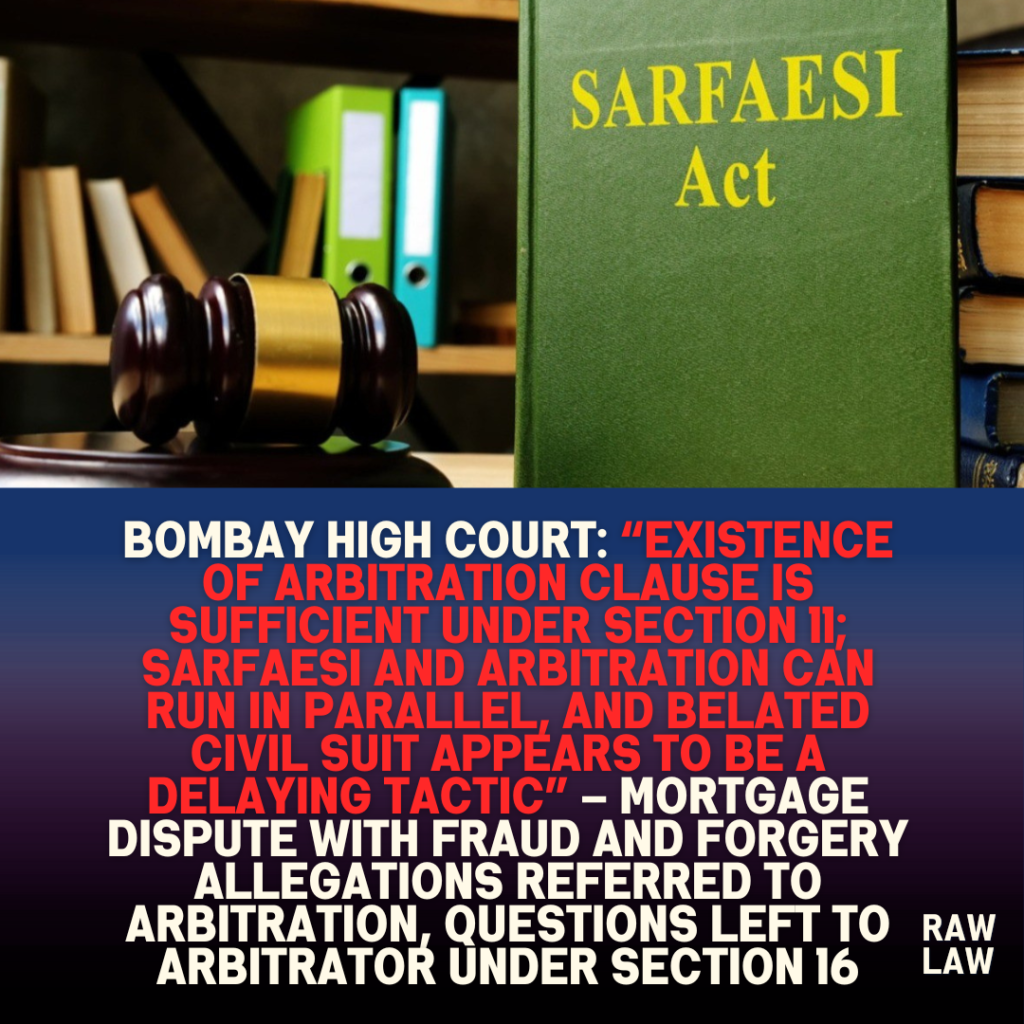Court’s Decision
The Bombay High Court allowed an application under Section 11 of the Arbitration and Conciliation Act, 1996, appointing Justice (Retd.) Naresh H. Patil, former Chief Justice of the Court, as sole arbitrator. The Court held that once an arbitration agreement exists, questions of fraud, forgery, or criminality cannot prevent reference to arbitration at this stage. It emphasized that disputes regarding validity of mortgage deeds and allegations of fraud are matters for the arbitrator under Section 16 of the ACA, and not for the referral court.
Facts of the Case
The applicant, a Non-Banking Financial Company (NBFC), sanctioned loans amounting to ₹3.44 crores to the respondent against a bungalow property. Mortgage deeds executed in December 2020 and February 2022 contained an arbitration clause.
The applicant invoked arbitration by notice dated 7 January 2023. The respondent denied the deeds, alleging forgery of signatures and fraud, and lodged an FIR in October 2023 against one of the applicant’s directors under Sections 420, 467, 468, 471 IPC. The respondent also filed a civil suit in 2024 seeking declaration of the documents as null and void, and relied on a DRT status quo order regarding the property.
Issues
- Whether the arbitration clause in the mortgage deeds is valid and enforceable despite allegations of fraud and forgery.
- Whether the pendency of FIR, civil suit, and SARFAESI proceedings bars reference to arbitration.
- Whether the unilateral right of the applicant to appoint an arbitrator is enforceable.
Petitioner’s Arguments
- The respondent received loan disbursements, including ₹16 lakhs, reflected in her bank statements and paid statutory charges of ₹62,600 for mortgage registration.
- The mortgage deeds expressly contained an arbitration clause, binding the parties to arbitral resolution.
- Lodging of FIR and civil proceedings cannot negate arbitrability.
- The respondent is raising belated and unsubstantiated allegations only to avoid arbitration.
Respondent’s Arguments
- She never executed the mortgage deeds or received the loan amounts; the documents and signatures are fabricated.
- A private handwriting expert confirmed forgery, and an FIR was lodged against the applicant’s director for fraud.
- Serious fraud involving forgery and criminal proceedings makes the matter non-arbitrable.
- A DRT order directed status quo on the property, and a civil suit is pending to declare the documents null and void.
Analysis of the Law
The Court reiterated that under Section 11, its jurisdiction is limited to a prima facie determination of the existence of an arbitration agreement. It is not the forum to conduct a mini-trial or evaluate disputed evidence.
It noted that:
- Bank entries prima facie show disbursal and payments, falling within the arbitration clause.
- FIR lodged against the director, without charge-sheet or trial, cannot bar arbitration.
- Civil and SARFAESI proceedings can proceed in parallel, as held in MD Frozen Foods v. Hero Fincorp Ltd.
Precedent Analysis
- A. Ayyasamy v. A. Paramasivam (2016) 10 SCC 386 – Distinguished between serious fraud (non-arbitrable) and fraud simplicitor (arbitrable). The present case did not involve public interest or governance issues, hence arbitrable.
- In Re: Interplay between ACA and Stamp Act (2024) 6 SCC 1 – Referral court must only examine prima facie existence of arbitration agreement, leaving disputes on validity for arbitrator.
- Managing Director, Bihar State Food and Civil Supply Corp. Ltd. v. Sanjay Kumar (2025 SCC OnLine SC 1604) – Supreme Court reiterated: “There is an arbitration agreement. The matter must end there.”
- Mangal Credit and Fincorp Ltd. v. GBL Chemical Ltd. (Bombay HC, 18 June 2025) – Fraud allegations were held to be preliminary issues for arbitrator; SLP against it was dismissed by the Supreme Court.
- Perkins Eastman Architects v. HSCC (India) Ltd. (2019 SCC OnLine SC 1517) – Unilateral appointment of arbitrator by one party is invalid; hence the Court appointed a neutral arbitrator.
Court’s Reasoning
- The arbitration clause exists in the mortgage deeds, and prima facie cannot be denied.
- Allegations of fraud and forgery, supported only by a private expert opinion and FIR, are issues for arbitrator under Section 16 ACA.
- SARFAESI and arbitration can run in parallel. The civil suit was filed belatedly and appears to be a delaying tactic.
- Court’s role under Section 11 is limited; competence-competence principle requires disputes on arbitrability to be decided by the arbitrator.
Conclusion
The Court allowed the application, appointed Justice (Retd.) Naresh H. Patil as sole arbitrator, and directed parties to bear costs equally. All issues of maintainability, fraud, and arbitrability are left open for decision by the arbitrator. Request for stay was rejected.
Implications
This judgment reinforces that fraud allegations, unless complex and involving public interest, do not prevent arbitration. It underscores the minimal scope of Section 11 courts, prioritizing party autonomy and competence-competence. It also reaffirms that unilateral appointment clauses are invalid post-Perkins Eastman.



